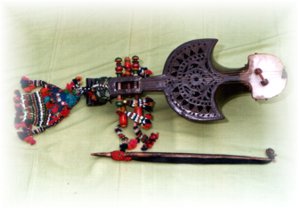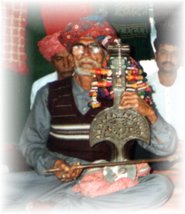|
Sundari is particularly a family instrument of Langa community in Kutch. Now-a-days, Sumarbhai, though aged, plays Sundari on some promising occasions in Jain Temple in Mundra, on marriages etc. Sumarbhai is eager to teach playing Sundari to the new generation with a view to preserve this typical folk instrument of Kutch. His sons – Jusab and Gaffur including his children can play Sundari as well. Sumarbhai is well known in Mundra – A Port town of Kutch. The other well known artist of Sundari is Ramju Buddha Langa of Bhuj. Ramju Langa also plays Sharnai, Naubat and Nagara. Ramjubhai learnt Sundari, Sharnai at the age of 8 years from his father. His family is known as “Daroga” as his family has been associated with Royal family for a long time. Ramju Langa plays Sundari, Sharnai, Naubat and Nagara in Darbargadh on festive occasion. Ramjubhai is also passionate interested to teach the instruments to the interested.
Surando:

Surando is an ancient folk musical instrument of Kutch. Surando is a stringed musical instrument played with the use of Bow, Gaz and Gazi in local dialect. The body of the instrument is made of all sorts of wood, but to serve as an excellent sound chamber Lahirro wood is the best one. Talhi, Bahan and Mango wood rank second, third and forth in importance. The Bow or Gaz is comprised of strings of horse's hair or gut fastened to each of the elastic stick. The Bow is placed on the strings at right angles to it and is moved back and forth across it. Producing sound with the help of the bow in resistance with the strings is a more advanced skill than plucking. Strings are tuned to a proper frequency by tuning the pags on the instruments. A Surando has six strings – five of steel and the sixth of copper and each strings has exact name like Agor, Tip, Jara etc. Surando known in Kutch is believed to have been well known as Sarinda in northern parts of India and in Sind of Pakistan. Surando is played like Sarangi and it is similar t Sarangi and Violin. According to Bhagavat Gomandal (a Gujarati encyclopedia of early 20th century), Surando is a bit different from Sarangi and it is believed to have been affected from teak wood. Surando is prepared artistically getting complicated carving from the single piece of teak wood. It is given a pea-cock shape. To get decorative impression of Surando, the tiny nails of brass can be fixed on its surface. It is also painted with colors prepared from mercury or zinc for attractive show.

The word Surando / Sarinda is secondary from the Persian word ‘Surayindah' meaning the producer of covers; the lower Persian sarinda is associated with a popular folk tale ‘Sorath Rai Diyach'. King Diyach of Sind offered his life at of Sarinda music. Surando is common to the Sind, Baluchistan and the frontier regions. It is called Saro (per.-surud = Music) in the Baluchistan region and Sarindah (per.-Surayindah) in the frontier region. The Sindhi Surando and the Baruchi Saroz instruments are equal in structure.
Surando, (‘the organ of tunes') has been played by the professional Sindhi bards the Charanas, Mangatas and Manganhars, Jats i.e. who earn their employment by playing musical instruments since long in Pakistan, Rajasthan of India. These wandering minstrels used to go around playing the Surando music and putting people's nobility and generosity to test. Their demand was not that of an ordinary mendicant, but rather a sort of officious consideration. They would use the rhythms of the melodious Surando music to attain their objective. According to the tradition, the music of Surando had an charming effect when handled by master musicians. Once an talented poet, named Bijal, by his superb Surando music exercised irresistible authority on the Samma chief, Khenghar, the ruler of Junagadh and asked for his head as a reward. To please him and to pay deference to the high art, Khenghar sacrificed his life of Surando music.
|